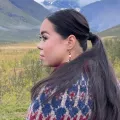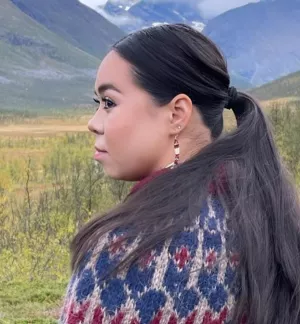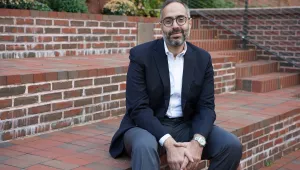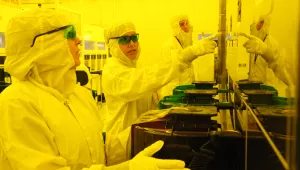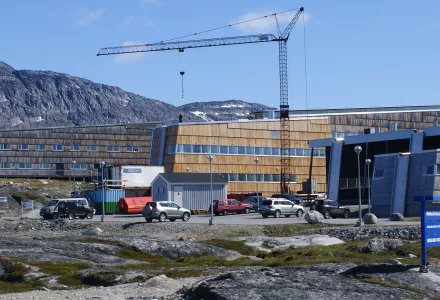
This article was produced as part of the International Workshop on Indigenous Youth Leadership for the Changing Arctic. The views expressed are those of the author alone.
In Greenland, nearly half of all students drop out before finishing higher education. It’s not hard to see why, there are lots of factors to this. But one of the reasons is: we’re a population that grows up speaking Greenlandic, our native tongue, but the further we go in the education system, the more we’re forced to operate in Danish, the language of our colonial power. By upper secondary school, all instruction is in Danish - and Greenlanders don’t bother showing up.
There’s another way. This last year, as a graduate student studying the impact of languages on education, I visited Sámi University of Applied Sciences in Guovdageaidnu, Norway. What I saw was inspiring: because all university programs are held in Sámi, students, professors, and employees are required to have a certain knowledge level of the language. Classes were full of Indigenous knowledge and Indigenous terms, with students mastering sophisticated concepts through the lens of their own ancestral history. Sámi University collaborates with other indigenous institutions to promote Indigenous education models and systems, supporting academic and societal decolonization and reconciliation. Sámi students and academics were motivated to pursue an education that felt like home.
But how can Greenland get there? The first step is to recognize that we are an only partially decolonized country. Education is the next vital frontier in our process of independence and build our capacities both in terms of institutions and the educators to staff them.
The University of Greenland (Ilisimatusarfik) is located in the capital city, Nuuk. Greenlandic is the official language used in Greenland, but every administrative system is in Danish. Upper secondary education is mostly taught in Danish, and nearly the entirety of higher education.
There are historical reasons for this: Under the period of Danization and modernization in the 1950s and 1960s, the prevailing attitude toward the Inuit was that we could be “improved” by being forced to speak Danish and to emulate the social systems and styles of our colonial power. This applied very much to education as well.
In fact, one of our great historical traumas, “The Experiment,” was a 1951 operation to take 22 Greenlandic Inuit children between the ages of 6-9 and re-educate them in foster families in Denmark. Their original parents were given no choice. Far from the program’s vision, where these “little Danes” would come back to Greenland and cure its underdevelopment, their fate was mostly tragic. Six children were adopted while in Denmark, and of the 16 who returned to Greenland, all were placed in Danish-speaking orphanages and never lived with their families again. They experienced mental health disturbances, trauma, identity crisis, and half of them died in young adulthood.
This was obviously extreme, but the shadows of colonialism still make us too susceptible to the idea that development and Danishness are the same thing. This internalized oppression among Greenlandic Inuit leads us to undervalue where we come from and what we’re capable of as a people.
Instead, we should demand more, especially in higher education. Not just more Greenlandic educators, but a shift in mindset. With education in Greenlandic. This would motivate Greenlandic educators as well: if higher education in Greenland is taught fully in Greenlandic, and Indigenous knowledge is implemented more in their education, there would be many more Inuit motivated to thrive in the education system. This is how we take back our identity as a people, not just following the Eurocentric path from our colonial power and what outsiders thought was “good for us.”
This has already started to happen in governance. In recognition of the growing capacity of Greenlanders to self-govern, in 2009, the Act on Greenland Self-Government gave Greenland its own Constitutional Law, with self-determination and self-governance in domestic affairs.
It's now time to recognize that Greenlanders are well-positioned to self-govern in terms of the educational system, as well; the copy-and-paste system from Denmark has served its purpose. As we can see by the number of dropouts, it is now time to take back our narrative in the education system.
Indigenous languages are foundational to identity, cultural heritage, and to our future as a people. By decolonizing our mindset and making more space in the educational system for our Indigenous languages, we strengthen our sense of who we are in our own terms, and instead of (mis)understanding ourselves in other cultures’ terms, we develop frameworks of our own. For example: still today in Danish textbooks the coming of Danish rule is described as "in the best sense" and the pre-contact Greenlanders are portrayed, romantically, as being "of the land" or "in harmony with the land." This view does a disservice to us, as a people who developed a sophisticated set of technologies that enabled our travel to Greenland over hundreds of miles of Arctic waters, and then to survive the harsh conditions. It over-credits the Danish and hides their economic motives for wanting access to our natural resources, minimalizing the history of their colonial power. A truer view - the one we should teach in any Indigenous-language version - is this: Greenlanders are innovators.
We need to extend our role as innovators into being the shapers of our own educational system, taking Sámi University as an inspiration in terms of teacher training and curriculum development. The sooner we fund a pilot program, the better.
Such steps are not only to our advantage, they’re our right: the Danish have an obligation to support and fund. This is in accord with the United Nations’ Indigenous Tribal Peoples Convention ILO Convention 1989 (No. 169) under ‘Education and Means of Communication’ Article 27-28, which says:
“…Education programmes and services for the peoples concerned shall be developed and implemented in co-operation with them to address their special needs, and shall incorporate their histories, their knowledge and technologies, their value systems and their further social, economic and cultural aspirations” (ILO C.169, 1989).
Under the following article it also says:
"The development and practice of the Indigenous languages of the people shall be taken to preservation and promotion."
Imagine being able to express your knowledge in your own language during your whole education. Inuit have been misunderstood for too long. It is now time to take our narrative back. The view in which one sees the world is naturally shaped, not only by one’s personal and relational experiences, but also by the theoretical and methodological views in which research emerges. We know the strategy has worked with Sámi University; we could do the same. A truly independent Greenland needs to Indigenize their own history, through strengthening their native language in the education system.
Linda Lyberth Kristiansen is a 25-year-old Inuk woman from Nuuk, Greenland. She was an Indigenous Studies graduate student at UiT- Arctic University of Norway in Tromsø. Her previous internship at the Inuit Circumpolar Council has led her to many roles focused on Arctic Policy matters and Indigenous peoples' rights, as well as cultural inclusion and improving resiliency and mental health for Indigenous peoples. Currently, Kristiansen is interning at UArctic - International Secretariat in Rovaniemi, Finland, while working on her master's thesis on "The Implementation of Indigenous Languages in Higher Education."
In 2023, Kristiansen took part in the International Workshop on Indigenous Youth Leadership for the Changing Arctic, hosted at Harvard Kennedy School's Belfer Center and the Tufts University Fletcher School of Law and Diplomacy. The course aims to empower Indigenous youth to become leaders in their communities, focusing on developing communication and negotiation skills, and learning about ecosystems, adaptation, and resilience. This article is based on the idea Kristiansen developed during the workshop, for which she was awarded "Most Promising Solution."
Kristiansen, Lynda Lyberth. “Decolonizing the Education System in Greenland.” Belfer Center for Science and International Affairs, Harvard Kennedy School, December 20, 2023

